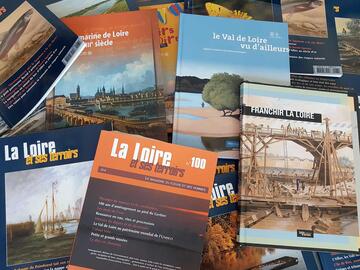
06/03/2025
[Fr] Décès de Philippe Auclerc
C'est avec tristesse que nous avons appris aujourd'hui le décès de Philippe Auclerc, co-fondateur de la maison d'édition "Loire et terroirs" et rédacteur...
Published on 05 September 2012 - Updated 23 April 2020
Cet article date d'il y a plus de 12 ans
Interview with Bernard Plat, Mayor of Rochecorbon, published in the 81st issue of "La Loire et ses terroirs" (summer 2012).
Listed as a UNESCO World Heritage, the parish of Rochecorbon sits on the right bank of the Loire. It borders the city of Tours to the west and Vouvray, the main district town, to the east. Nestling at the foot of a hillside, it overlooks the Loire for some 4 kilometres, stretching across the valleys for 1.5 kilometres and covering the hillside with 300 hectares of AOC Vouvray vines. 3,347 inhabitants live on its 1,698 hectares, just 15 minutes away from Tours city centre. It boasts a rich architectural heritage including the 11th century Notre-Dame de Vosnes church, listed as a Historical Monument, which the town’s officials have sought to upkeep and preserve throughout its history. The inclusion of Rochecorbon as a UNESCO World Heritage led the municipal council quite naturally to adopt its management plan.
This is because we consider it a duty for those tasked with municipal management to protect, upkeep and enhance the heritage that has been passed down to us. This wealth encompasses the landscape, architecture and culture. It is also expressed through the expertise specific to local and regional activities, or specific projects well worth safeguarding.
To meet these objectives we have geared municipal policy towards an environmentally-friendly outlook, taking up the river as our own once again, protecting the territory and preserving the identity of our parish to maintain our quality of life so that Rochecorbon continues to be a village where life is good.
To this end, in 1995, a footpath was laid along the banks of the Loire for pedestrians and cyclists alike, which we would now like to extend as far as Vouvray. At the same time, a boating excursion was set up to show tourists the hillside as seen from the Loire as well as the river’s fauna and flora.
In 2010, with the parish of Parçay-Meslay, our neighbour to the north-west which forms a continuity of cereal plateau and vineyards, we initiated the département's, and certainly the Centre region’s, first inter-parish protected agricultural zone (ZAP). At the beginning of 2013, this will be an easement of our local urban planning project (PLU). We will thus keep close tabs on town planning with a view to preserving the picturesque character of Rochecorbon and the wealth of its architectural and viticultural heritage, in a context that will remain architecturally coherent by the transformation of our Protection Zone for Architectural, Urban and Landscape Heritage (ZPPAUP) into an Architecture and Heritage Enhancement Area (AVAP).
One particular association has brought traditional boating back to life on the Loire, along with an educational workshop on building and servicing gabarres and toues (traditional barges) under installation.
A market garden project on the Loire banks with organic crops will be planted.
For tourists, a troglodytic circuit is available and will be rounded off next spring with a “history in the street” circuit in discovery of our fine residences, châteaux and buildings from the past.
Lastly our ambition is to develop the crossing of Rochecorbon by the D952, the “Loire levee”, to get rid of its main road appearance and restore to the centre of our village – along the Loire stretch – its character of a peaceful village at one with the river … and we are going to remove the water treatment plant from its base to this end.
All of these projects are naturally being discussed and studied with expert companies – each in their field – for although elected officials come up with the idea because they know “their parish” and are thinking about its future, they do not have the necessary skills for seeing their projects through successfully – in technical or administrative terms – for landing grants for example … The lack of financial means is obviously the main obstacle to completing in due time these key investments that are necessary to ensure the future of the UNESCO World Heritage for which we are responsible.
With the amiable authorisation of " La Loire et ses terroirs ".
Issue no. 81, summer 2012.